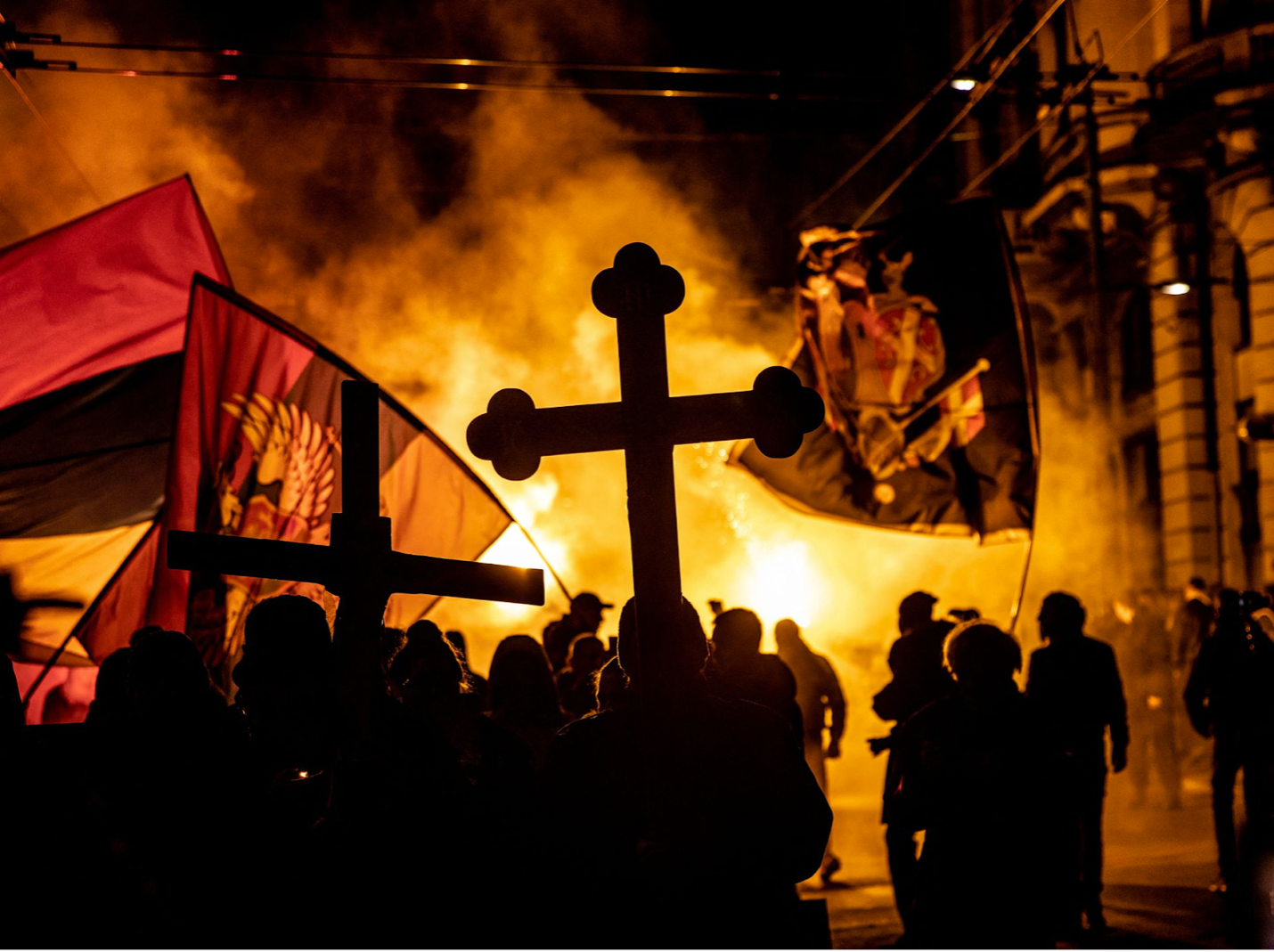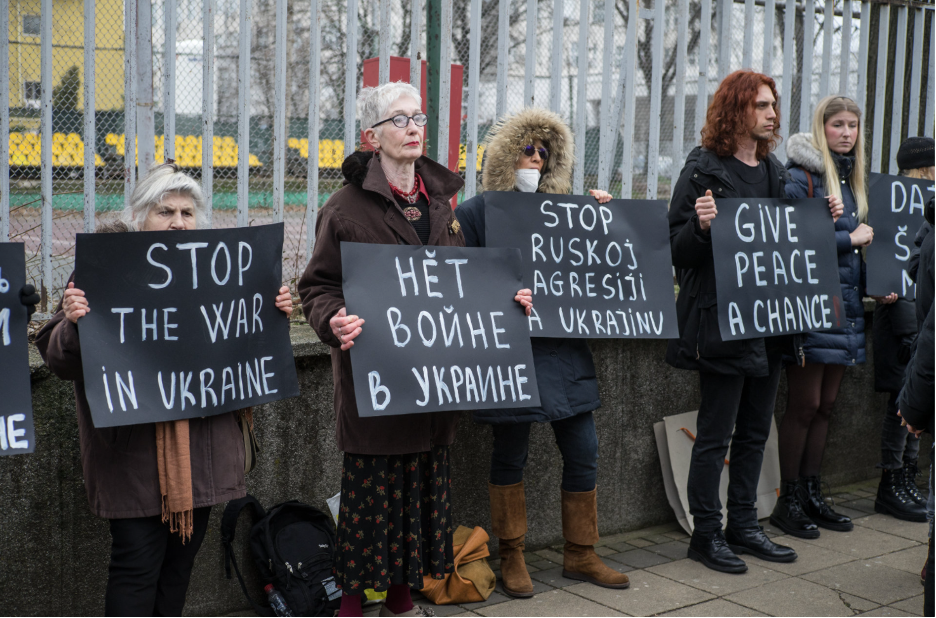While Serbia does not share a direct border with Ukraine, it is close enough that when the fighting broke out I immediately called my Serbian relatives on Viber to ask what they had heard about the conflict and what was happening on the ground. In contrast to the overwhelmingly anti-Russian reactions shared on Western media, my Serbian relatives expressed a more lukewarm attitude towards the Russian side. They explained reasonably that Ukraine is growing closer to the West and Putin does not like that, so he is trying to persuade Ukraine to come back over to his side. My relatives repeated the Serbian government’s narrative that Serbia is a “neutral country” that does not want to take sides in the conflict, a position they view in a positive light. This narrative of neutrality is being used by the Serbian government to justify its refusal to impose sanctions and take a stronger anti-Russian stance.
The Russia-Ukraine War puts Serbia and other Eastern European countries in an increasingly precarious position. This position is being contested both externally, through increasing pressure from the European Union, and internally through street protests and social media as citizens fight over where their loyalties lie and the future of their country. As the pressure mounts, governments and citizens must decide whether to take a strong stance against Russia given the high economic, political and security costs of doing so.

Officially, the Serbian government is claiming a “neutral” policy towards the conflict. They have communicated to Ukraine that they respect its territorial integrity, are committed to peace and international law, and stand ready to provide humanitarian aid and accept refugees in Serbia. Serbia also adopted the UN resolution condemning Russia’s attack on Ukraine, but only because this declaration did not include sanctions. Serbia has stopped short of imposing sanctions because of still-fresh memories of NATO sanctions during the 1990s wars (and ongoing sanctions against Bosnian Serb leaders), which Russia opposed.
The 1999 NATO aerial bombing campaign against Serbia presents an additional stumbling block influencing Serbian anti-NATO attitudes today. These bombings, whose 23rd anniversary was commemorated in Serbia this week, are still very painful and recent in popular memory. The air strikes killed several hundred civilians, were called war crimes by some human rights organizations and were again opposed by Russia. The bombings cause ongoing resentment and suspicion towards the West among some segments of Serbian society, making them resistant to further alignment with the western powers. In both Serbia and Ukraine, the growing influence of the West and NATO versus the Russian sphere of influence is a crux of the current conflict and the controversies around it.
To further explain Russia’s influence, Serbia relies heavily on Russian energy sources, and on Russia’s political support in its ongoing fight for sovereignty over former-province Kosovo. Russia’s veto vote at the UN Security Council is crucial in blocking Kosovo’s independence. Finally, Serbia is in the midst of an election season where imposing sanctions could alienate pro-Russian voters of the ruling Serbian Progressive Party (SNS) seeking to maintain power.
However, this official policy of Serbian neutrality is subject to increased pressure externally from the EU. On March 15th, EU official Michael Siebert issued a stern warning that Serbia will pay “a price” for refusing to place sanctions on Russia and thereby being “on the wrong side of the conflict.” Serbia is the only European country aside from Belarus that has not imposed sanctions against Russia. Previously, nine Members of the European Parliament (MEPs) called on the European Commission to suspend Serbia’s EU accession talks and cut off financial support unless they join sanctions. As Serbia is an official EU candidate country, it is expected to “gradually align” with its foreign policy and security decisions, including joining sanctions against Russia. Despite these accumulating warnings, Serbia’s parliamentary speaker again reassured the Russian Ambassador on Tuesday that Belgrade will not impose sanctions on Moscow.
The Serbian official policy of military neutrality is also being increasingly contested internally from two sides of the Serbian public, the political right and the left. On the pro-Russian side, analysts say this policy of neutrality is undermined by Serbian right-wing organizations who are mobilizing volunteer soldiers to join the Russian fight in Ukraine. Though participating in armed conflict abroad is officially illegal in Serbia and condemned by the government, it has not punished individuals for fighting in Ukraine in the past.
The same right-wing nationalist groups mobilizing volunteers are also holding rallies in Belgrade, claiming that “Mother Russia will win.” They reiterate the long-standing sense of allegiance and “brotherhood” with Russia. Again reflecting the unresolved pain of the 1990s NATO bombings, these Serbs feel that Putin is fighting a justified battle against the West, which “is now facing what it did to Serbia in the 1990s.” They reiterate the Kremlin’s appropriative claims of “genocide” against Russian-speakers and the need to “denazify” Ukraine. Ironically, these same far-right nationalist groups also flirt with neo-Nazism and engage in genocide denial. They criticize Serbia’s official policy of neutrality as not going far enough to support Russia.
One leftist activist critiqued the pro-Russia side on Facebook, posting ironically that “only in Serbia is patriotism proven through love for another country.” These activists point out that “Mother Russia” has abandoned Serbia again and again, during the ‘90s wars and again today in its fight against Kosovo’s independence. Serbs who declare support for Ukraine on social media are called fascists, Nazis, and foreign mercenaries.

These pro-Western activists criticize the government’s lukewarm stance towards Russia and its “tacit support for extremists.” Organizations like the Youth Initiative for Human Rights (YIHR) call for the government to officially condemn the pro-Russian rallies, come out and attend the many pro-Ukrainian protests being held in the capital, and firmly declare that “Serbia’s future is not in Putin’s Russia but in the European Union.” Women in Black Serbia has also organized continuous protests in collaboration with members of the Ukrainian, Belarussian, and Russian diaspora in Serbia. They demonstrate support for Russian and Belarusian war deserters and solidarity with feminists and peace activists in Russia and Ukraine.
The rising controversy over Serbia’s “neutral” stance towards Ukraine reveals how Serbia’s values and political future are also being contested. Following a decades-long balancing act, now that push has come to shove, where do Serbia’s loyalties lie— with Russia or with the West? Though this war presents risks to their national interests, is that a valid excuse for small countries like Serbia not to take a stand against Russia’s aggression and authoritarianism? These tensions raise long-standing questions for the West too. Does the EU want to finally include Eastern Europe among its official member states, or will it leave them behind to sink further under Putin’s influence? These questions determine the future of Serbia and many other countries around the world facing this dilemma, like Bulgaria, Turkey, China, Uganda, and South Africa. Citizens and governments need to make their choices in light of today’s challenges to democracy and the post-WWII global security order.
Nikoleta Sremac is a PhD Student in Sociology and a Research Assistant at the Center for Holocaust and Genocide Studies at the University of Minnesota. She studies gender, social movements, and collective memory of mass violence. Her dissertation focuses on gendered memory politics and activism related to the 1990s Yugoslav Wars in Serbia.

Comments